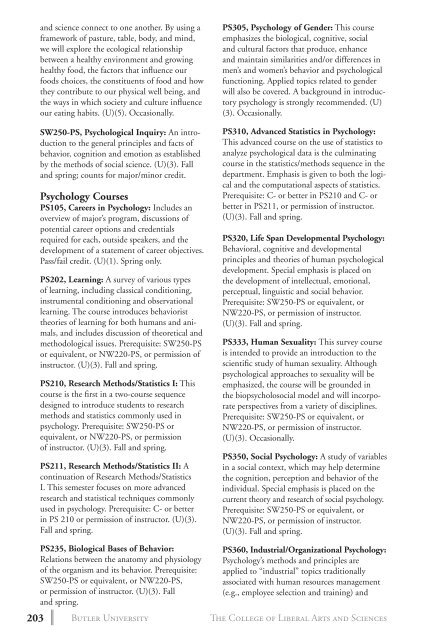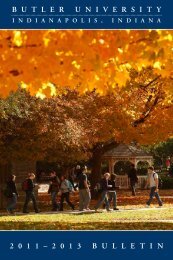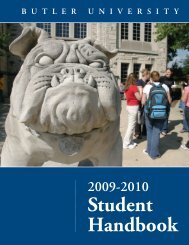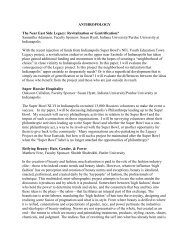The College of Liberal Arts and Sciences - Butler University
The College of Liberal Arts and Sciences - Butler University
The College of Liberal Arts and Sciences - Butler University
Create successful ePaper yourself
Turn your PDF publications into a flip-book with our unique Google optimized e-Paper software.
203<br />
<strong>and</strong> science connect to one another. By using a<br />
framework <strong>of</strong> pasture, table, body, <strong>and</strong> mind,<br />
we will explore the ecological relationship<br />
between a healthy environment <strong>and</strong> growing<br />
healthy food, the factors that influence our<br />
foods choices, the constituents <strong>of</strong> food <strong>and</strong> how<br />
they contribute to our physical well being, <strong>and</strong><br />
the ways in which society <strong>and</strong> culture influence<br />
our eating habits. (U)(5). Occasionally.<br />
SW250-PS, Psychological Inquiry: An introduction<br />
to the general principles <strong>and</strong> facts <strong>of</strong><br />
behavior, cognition <strong>and</strong> emotion as established<br />
by the methods <strong>of</strong> social science. (U)(3). Fall<br />
<strong>and</strong> spring; counts for major/minor credit.<br />
Psychology Courses<br />
PS105, Careers in Psychology: Includes an<br />
overview <strong>of</strong> major’s program, discussions <strong>of</strong><br />
potential career options <strong>and</strong> credentials<br />
required for each, outside speakers, <strong>and</strong> the<br />
development <strong>of</strong> a statement <strong>of</strong> career objectives.<br />
Pass/fail credit. (U)(1). Spring only.<br />
PS202, Learning: A survey <strong>of</strong> various types<br />
<strong>of</strong> learning, including classical conditioning,<br />
instrumental conditioning <strong>and</strong> observational<br />
learning. <strong>The</strong> course introduces behaviorist<br />
theories <strong>of</strong> learning for both humans <strong>and</strong> animals,<br />
<strong>and</strong> includes discussion <strong>of</strong> theoretical <strong>and</strong><br />
methodological issues. Prerequisite: SW250-PS<br />
or equivalent, or NW220-PS, or permission <strong>of</strong><br />
instructor. (U)(3). Fall <strong>and</strong> spring.<br />
PS210, Research Methods/Statistics I: This<br />
course is the first in a two-course sequence<br />
designed to introduce students to research<br />
methods <strong>and</strong> statistics commonly used in<br />
psychology. Prerequisite: SW250-PS or<br />
equivalent, or NW220-PS, or permission<br />
<strong>of</strong> instructor. (U)(3). Fall <strong>and</strong> spring.<br />
PS211, Research Methods/Statistics II: A<br />
continuation <strong>of</strong> Research Methods/Statistics<br />
I. This semester focuses on more advanced<br />
research <strong>and</strong> statistical techniques commonly<br />
used in psychology. Prerequisite: C- or better<br />
in PS 210 or permission <strong>of</strong> instructor. (U)(3).<br />
Fall <strong>and</strong> spring.<br />
PS235, Biological Bases <strong>of</strong> Behavior:<br />
Relations between the anatomy <strong>and</strong> physiology<br />
<strong>of</strong> the organism <strong>and</strong> its behavior. Prerequisite:<br />
SW250-PS or equivalent, or NW220-PS,<br />
or permission <strong>of</strong> instructor. (U)(3). Fall<br />
<strong>and</strong> spring.<br />
<strong>Butler</strong> <strong>University</strong><br />
PS305, Psychology <strong>of</strong> Gender: This course<br />
emphasizes the biological, cognitive, social<br />
<strong>and</strong> cultural factors that produce, enhance<br />
<strong>and</strong> maintain similarities <strong>and</strong>/or differences in<br />
men’s <strong>and</strong> women’s behavior <strong>and</strong> psychological<br />
functioning. Applied topics related to gender<br />
will also be covered. A background in introductory<br />
psychology is strongly recommended. (U)<br />
(3). Occasionally.<br />
PS310, Advanced Statistics in Psychology:<br />
This advanced course on the use <strong>of</strong> statistics to<br />
analyze psychological data is the culminating<br />
course in the statistics/methods sequence in the<br />
department. Emphasis is given to both the logical<br />
<strong>and</strong> the computational aspects <strong>of</strong> statistics.<br />
Prerequisite: C- or better in PS210 <strong>and</strong> C- or<br />
better in PS211, or permission <strong>of</strong> instructor.<br />
(U)(3). Fall <strong>and</strong> spring.<br />
PS320, Life Span Developmental Psychology:<br />
Behavioral, cognitive <strong>and</strong> developmental<br />
principles <strong>and</strong> theories <strong>of</strong> human psychological<br />
development. Special emphasis is placed on<br />
the development <strong>of</strong> intellectual, emotional,<br />
perceptual, linguistic <strong>and</strong> social behavior.<br />
Prerequisite: SW250-PS or equivalent, or<br />
NW220-PS, or permission <strong>of</strong> instructor.<br />
(U)(3). Fall <strong>and</strong> spring.<br />
PS333, Human Sexuality: This survey course<br />
is intended to provide an introduction to the<br />
scientific study <strong>of</strong> human sexuality. Although<br />
psychological approaches to sexuality will be<br />
emphasized, the course will be grounded in<br />
the biopsycholosocial model <strong>and</strong> will incorporate<br />
perspectives from a variety <strong>of</strong> disciplines.<br />
Prerequisite: SW250-PS or equivalent, or<br />
NW220-PS, or permission <strong>of</strong> instructor.<br />
(U)(3). Occasionally.<br />
PS350, Social Psychology: A study <strong>of</strong> variables<br />
in a social context, which may help determine<br />
the cognition, perception <strong>and</strong> behavior <strong>of</strong> the<br />
individual. Special emphasis is placed on the<br />
current theory <strong>and</strong> research <strong>of</strong> social psychology.<br />
Prerequisite: SW250-PS or equivalent, or<br />
NW220-PS, or permission <strong>of</strong> instructor.<br />
(U)(3). Fall <strong>and</strong> spring.<br />
PS360, Industrial/Organizational Psychology:<br />
Psychology’s methods <strong>and</strong> principles are<br />
applied to “industrial” topics traditionally<br />
associated with human resources management<br />
(e.g., employee selection <strong>and</strong> training) <strong>and</strong><br />
<strong>The</strong> <strong>College</strong> <strong>of</strong> <strong>Liberal</strong> <strong>Arts</strong> <strong>and</strong> <strong>Sciences</strong>
















